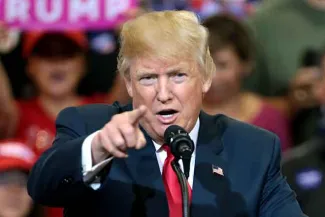
Trump aims to shut down state climate policies
President Donald Trump has launched an all-out legal attack on states’ authority to set climate change policy.
His executive order, issued Tuesday, directs the Department of Justice to challenge a huge swath of state laws and regulations. The order aims at measures that seek to cut carbon emissions, penalize energy companies and limit drilling permits. It also targets state-led lawsuits against fossil fuel companies over the damages caused by climate change.
Trump’s directive orders Attorney General Pam Bondi to “stop the enforcement” of any state laws related to climate change, including any that are seen as “burdening” the use of domestic energy resources. Such language could include state laws that mandate a transition to clean electricity sources.
The order specifically calls out “climate Superfund” policies in Vermont and New York, which require fossil fuel companies to pay for some of the damages caused by climate change. It also targets California’s cap-and-trade law, which places a limit on emissions through auctions of carbon credits.

U.S. President Donald Trump. FlickrCC - Gage Skidmore
While Trump’s order says such state policies are unconstitutional, climate-focused state leaders say his administration has no legal basis to unravel their efforts.
“The federal government cannot unilaterally strip states’ independent constitutional authority,” New York Gov. Kathy Hochul and New Mexico Gov. Michelle Lujan Grisham, both Democrats, wrote in a joint statement from the U.S. Climate Alliance. “We are a nation of states — and laws — and we will not be deterred.”
Hochul and Lujan Grisham co-chair the alliance, a coalition of 24 governors focused on reducing emissions.
Michael Gerrard, faculty director of Columbia University’s Sabin Center for Climate Change Law, told Politico that the order is “toothless.”
“[Trump] has no authority on his own to nullify state laws,” he told the outlet.
But the order throws the might of the federal government into a sprawling legal battle over states’ authority to set climate policy and seek damages for disasters.
It could force states to face expensive litigation and years of legal uncertainty. Trump-appointed judges on the U.S. Supreme Court and elsewhere have at times been hostile to environmental regulations. And it’s unclear whether the order will have a chilling effect on state efforts to craft more climate legislation.
















